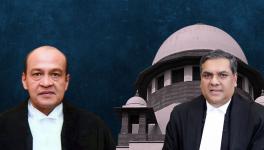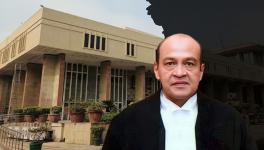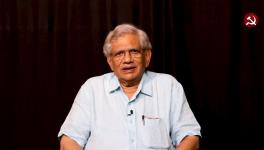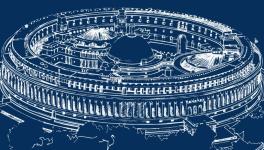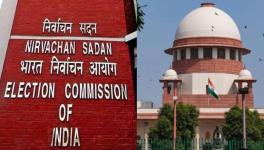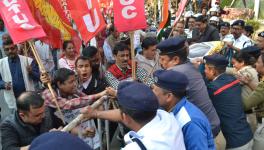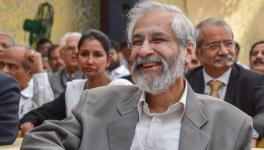Opaque System Erodes Independence of Judiciary, Says John Brittas
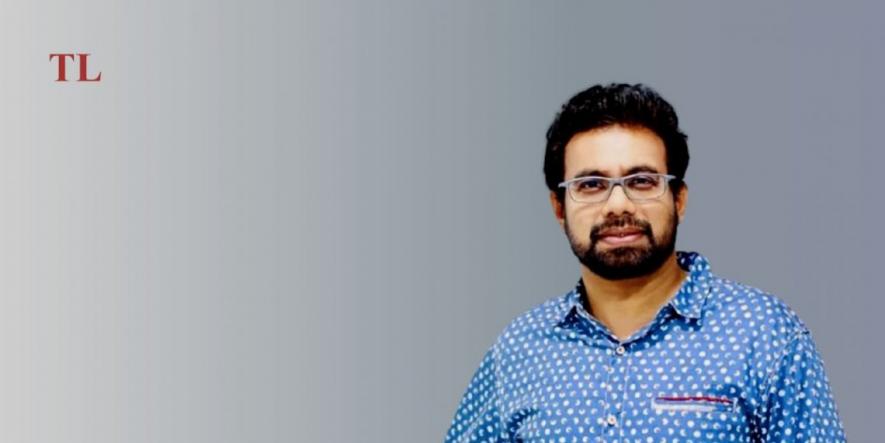
Image credit: The Leaflet
John Brittas is a first-time member of the Rajya Sabha from Kerala representing the Communist Party of India (Marxist) (CPI(M)). He is also the managing director of Kairali TV and a journalist by profession. Brittas, in his maiden speech in the Rajya Sabha, spoke about the lack of diversity in Indian judiciary, during the discussion on the High Court and the Supreme Court Judges (Salaries and Conditions of Service (Amendment) Bill, 2021, which was subsequently passed by the House on December 13. Brittas was pleasantly surprised when the Rajya Sabha chairperson, and Vice-President, M. Venkaiah Naidu, personally called him to congratulate for his speech in the House, and regretted that it went unreported in the media. Judges appointing Judges is unheard of, said Brittas in his speech. The Chief Justice of India (CJI), N.V. Ramana, reportedly called this view a myth.
In this interview with The Leaflet Editor, V. Venkatesan, John Brittas (JB) explains the context and significance of his remarks on the higher judiciary, answering specific questions arising from his recent article.
Excerpts from the interview:
TL: Your speech in Parliament about the need for an independent judiciary was well appreciated. You have identified lack of diversity and secrecy around the appointment of judges as the twin dangers to the judiciary’s independence. Can you explain? That is, how will lack of diversity and secrecy over appointments compromise the judiciary’s independence?
JB: While speaking in Parliament, I was expressing the concern of the general public with regard to our Judiciary. The basic premise was our expectations because the judiciary continues to be the beacon of hope for the people. When other pillars of democracy are evidently faltering, our judiciary continues to be the last post of justice. It was in this context that I raised certain issues that are plaguing our judicial system. Senior judges and former judges have explicitly made similar remarks.
As I see it, lack of diversity and transparency are twin dangers challenging the independence of our judicial system. The social realities of the nation do not have any sort of manifestation in our Courts. Dr B.R. Ambedkar and other architects of our Constitution would not have envisaged a system which is shrouded in secrecy and darkness. Only when a system is transparent, it can instill faith in the people. Even if there are no wrong doings, a system that is not transparent will create lingering doubts in the minds of the people. I only exhorted to ensure that the higher seats of justice should represent the social composition of our People and right persons should be found through a transparent process of appointment.
TL: What are the inherent dangers according to you, in the current selection process for judges?
JB: The very judges who are part of the Bench which ruled in favour of a collegium have expressed their apprehensions with regard to the present process of appointment of judges in the higher judiciary. You have seen a Chief Justice in tears while pleading to the Government to make appointments. I myself had asked a couple of questions with regard to the long pending list of names which have been sent by the collegium to the Government. In our country, the law insists that even an appointment to the post of a last grade employee shall be fair and transparent. Shouldn’t we need a transparent system for judicial appointments?
There are cases where the government refused to make appointments or delayed inordinately to tweak the seniority. Even with regard to the vacancies that are there, you can very well see almost half the posts are vacant at our High Courts. This is at a time when pending cases have only gone up. Even the levels of clearances that are being mentioned for the appointment of a judge do not have any legal or constitutional sanctity. The arms of the Executive like the Intelligence Bureau of the government cannot be considered to be a constitutional safeguard in the process of appointment of judges. All these are creating an opaque system which erodes the independence of the judiciary.
TL: You have said that an executive which believes in excessive power will find it expedient to have an individual-centric rather than system-centric apparatus. Can you explain?
JB: It is well known that the Executive is tightening its grip over the appointment of judges. There is a general view that the very nature of the present government underlines the use of excessive power in all spheres. Independent institutions are influenced or interfered with. We all know the incidents that have occurred in relation to the functioning of the Election Commission. Has any satisfactory response come up with regard to the denial of appointment [to the Supreme Court] of Justice Akil Kureshi?
Any system of appointment based on individuals has inherent danger of being swayed. There could be brilliant decisions, but a system-oriented process always guarantees a better result. Dr Ambedkar has warned against the system of judges selecting judges by saying that “[t]o allow Chief Justice practically a veto upon the appointment of judge is really to transfer the authority to the Chief Justice which we are not prepared to vest in the President or the Government of the day”. No sensible person would either argue for political supremacy in judicial appointments.
TL: You also referred to former CJI Ranjan Gogoi making it clear in his memoirs that he wanted to avoid any confrontation with the Centre. Is confrontation between the executive and judiciary a prerequisite for a healthy democracy?
JB: Our founders have ushered in a parliamentary form of government where each pillar – executive, legislature and judiciary – has a definite role to play. The checks and balances need to be maintained for the effective functioning of a democracy. The legislature and judiciary are cardinal to ensure robust functioning. We all know what is happening in the Parliament. The Executive that is supposed to be accountable to the Legislature has made it a point that no serious debate or perusal of Bills takes place. The Chief Justice of India, N.V. Ramana, had to lament the ‘sorry state of affairs” on law making and Parliament debate in the country.
The present Government is more interested in the construction of the new Parliament building and not in the process of the Parliament. Sessions after sessions are washed off whereas laws are made like baking bread.
Though former Chief Justice of India, Ranjan Gogoi, wrote his memoirs “Justice for the Judge” to justify his omissions and commissions, a close reading of the lines or between the lines brings out many truths. He did say that he wanted to avoid confrontation with the Centre. We know what he really meant as he was nominated to Rajya Sabha within four months after relinquishing his post. Further, a close reading of many of his verdicts raise more questions than answers.
No wonder, one of the newspaper analysts said “Indian Judiciary is facing an increasing lack of trust by the public” commenting on his nomination to the Rajya Sabha. Many independent souls were vocal and they said it raised question mark over the judiciary’s independence since Justice Ranjan Gogoi allocated and handled key cases in which the Government had major political stakes until just four months before his nomination. We do not want to have confrontation between different offices, but there should not be undue dependence either.
TL: You claim that most senior judges appeared to yield to the Centre. Can you cite some instances?
JB: Various judgements of courts are closely scrutinised by the general public and if they have concerns and apprehensions that should not be ignored. Referring the Sabarimala verdict to a larger Bench, the Ayodhya verdict, the decision on Rafale, the divesting of powers of CBI Director Alok Verma, silence over the abrogation of Article 370 and conversion of Jammu and Kashmir State into two union territories and the long-pending case on Electoral Bonds etc have come up for numerous interpretations in the legal circles itself.
TL: What according to you are the best practices from other jurisdictions. In a new National Judicial Appointments Commission, you are suggesting that the executive, legislature, judiciary, the bar and the public must be represented. Do you have any specific model in mind while suggesting this? Are you in favour of the American style screening of Presidential appointments to the Supreme Court through a televised interview by Parliament members?
JB: There can be no second opinion that India should have an independent judiciary insulated from interference from other pillars. When the National Judicial Appointments Commission (NJAC) was scrapped, it was the intention of the Supreme Court to bring in a better system in that place. Almost seven years have passed and no new norms have come into effect.
The constitutional validity of NJAC was challenged by several bodies and groups on the ground that it might dilute the independence of the judiciary by giving the government and the political class a substantial say in the process of appointment. We need to have a system of appointment devoid of this executive influence, but with representation from all. That is why I spoke about the executive, the legislature, the judiciary, the Bar and the public.
In our country, the law insists that even an appointment to the post of a last grade employee shall be fair and transparent. Shouldn’t we need a transparent system for judicial appointments? We should not forget the fact that the Supreme Court of India is the custodian of the Constitution of India.
TL: The NJAC was struck down by the Supreme Court in 2015. Are you in favour of its revival?
JB: There should be meaningful debate to arrive at the structure and format of NJAC. Our sole purpose should be to have a transparent system which ensures the independence of the Judiciary. As I said in my speech, we need to emulate the best practices in the world. We drafted a Constitution imbibing best practices from different countries. Why should we shy away from undertaking a process that equips the nation with a better system of appointment of judges?
TL: You also referred to the social composition of the judiciary. Where did you get the data of caste break up of judges. A community that hardly accounts for four per cent of the population occupies more than 30 per cent posts in higher judiciary, you say. Out of 45 judges of Karnataka High court, 17 are Brahmins you say. What is the source of data for this claim?
JB: I had doled out statistics precisely to emphasise the fact that our higher courts have to reflect the social realities. We are a country where our Supreme Court did not have a Judge from backward and Dalit communities till 1980. Do you think that was what Dr Ambedkar thought about our Supreme Court? It is not a herculean task to identify the composition of judges. We are talking about a country which has got caste reservations in education and employment. This is the time when major political parties have been demanding a ‘caste census‘. We have hardly 750 judges in the Supreme Court and various High Courts. A little homework can equip you with the data regarding social composition.
We are a population of 135 crore people. When we are celebrating our 75th Anniversary of Independence, can anybody say that we are unable to get meritorious candidates from different social strata and sections to fill up a few hundred vacancies in the Judiciary?
TL: Merit and quality have nothing to do with massive under-representation of Dalits, OBCs, minorities and women, according to you. Can you elaborate?
JB: We are a population of 135 crore people. When we are celebrating our 75th Anniversary of Independence, can anybody say that we are unable to get meritorious candidates from different social strata and sections to fill up a few hundred vacancies in the judiciary? We can very well ensure merit and quality even while ensuring social representation in our courts.
TL: Do you agree with CJI Ramana about the sorry state of affairs in law making and parliamentary debate? How do you think it can be remedied?
JB: I fully subscribe to the views of the Chief Justice of India Ramana regarding the functioning of the legislature. I have been observing the functioning of the Parliament closely for more than three decades. I have seen legendary leaders cutting across political lines being participants of debates and law-making in the country. This includes leaders from BJP [Bharatiya Janata Party] like Atal Bihari Vajpayee, L.K. Advani, Arun Jaitley, Sushma Swaraj etc. There was a spirit of give and take and opposition was considered to be pivotal in the functioning of the Parliament.
Now a days, media talks of “efficiency” of the Parliament. They are not bothered about the “effect” of the Parliament. The present Government is more interested in the construction of the new Parliament building and not in the process of the Parliament. Sessions after sessions are washed off whereas laws are made like baking bread.
Parliamentary Standing Committees were formed to scrutinise and evaluate the impact of Bills as they affect the society and economy. Earlier we used to have almost 70 per cent of the Bills referred to the Standing Committee. Now it is hardly 10 per cent. If the controversial farm bills had been referred to the Standing Committee, it would have saved the nation from many agonies. The scars and loss of lives could have been avoided. I do hope that better sense prevails over the Government and we take a cue out of the words of wisdom from the Chief Justice of India.
Get the latest reports & analysis with people's perspective on Protests, movements & deep analytical videos, discussions of the current affairs in your Telegram app. Subscribe to NewsClick's Telegram channel & get Real-Time updates on stories, as they get published on our website.










